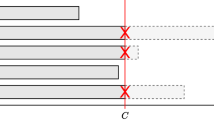Abstract
We present a novel approach to meta-learning, which is not just a ranking of methods, not just a strategy for building model committees, but an algorithm performing a search similar to what human experts do when analyzing data, solving full scope of data mining problems. The search through the space of possible solutions is driven by special mechanisms of machine generators based on meta-schemes. The approach facilitates using human experts knowledge to restrict the search space and gaining meta-knowledge in an automated manner. The conclusions help in further search and may also be passed to other meta-learners. All the functionality is included in our new general architecture for data mining, especially eligible for meta-learning tasks.
Preview
Unable to display preview. Download preview PDF.
Similar content being viewed by others
References
Guyon, I.: Nips 2003 workshop on feature extraction (December 2003), http://www.clopinet.com/isabelle/Projects/NIPS2003/
Guyon, I., Gunn, S., Nikravesh, M., Zadeh, L.: Feature extraction, foundations and applications. Springer, Heidelberg (2006)
Guyon, I.: Performance prediction challenge (July 2006), http://www.modelselect.inf.ethz.ch/
Pfahringer, B., Bensusan, H., Giraud-Carrier, C.: Meta-learning by landmarking various learning algorithms. In: Proceedings of the Seventeenth International Conference on Machine Learning, pp. 743–750. Morgan Kaufmann, San Francisco (2000)
Brazdil, P., Soares, C., da Costa, J.P.: Ranking learning algorithms: Using IBL and meta-learning on accuracy and time results. Machine Learning 50(3), 251–277 (2003)
Bensusan, H., Giraud-Carrier, C., Kennedy, C.J.: A higher-order approach to meta-learning. In: Cussens, J., Frisch, A. (eds.) Proceedings of the Work-in-Progress Track at the 10th International Conference on Inductive Logic Programming, pp. 33–42 (2000)
Peng, Y.H.: Falch, P., Soares, C., Brazdil, P.: Improved dataset characterisation for meta-learning. In: The 5th International Conference on Discovery Science, January 2002, pp. 141–152. Springer, Luebeck (2002)
Levin, L.A.: Universal sequential search problems. In: Problems of Information Transmission (translated from Problemy Peredachi Informatsii (Russian)), vol. 9 (1973)
Li, M., Vitányi, P.: An Introduction to Kolmogorov Complexity and Its Applications. In: Text and Monographs in Computer Science. Springer, Heidelberg (1993)
Author information
Authors and Affiliations
Editor information
Rights and permissions
Copyright information
© 2008 Springer-Verlag Berlin Heidelberg
About this paper
Cite this paper
Grąbczewski, K., Jankowski, N. (2008). Meta-learning with Machine Generators and Complexity Controlled Exploration. In: Rutkowski, L., Tadeusiewicz, R., Zadeh, L.A., Zurada, J.M. (eds) Artificial Intelligence and Soft Computing – ICAISC 2008. ICAISC 2008. Lecture Notes in Computer Science(), vol 5097. Springer, Berlin, Heidelberg. https://doi.org/10.1007/978-3-540-69731-2_53
Download citation
DOI: https://doi.org/10.1007/978-3-540-69731-2_53
Publisher Name: Springer, Berlin, Heidelberg
Print ISBN: 978-3-540-69572-1
Online ISBN: 978-3-540-69731-2
eBook Packages: Computer ScienceComputer Science (R0)




